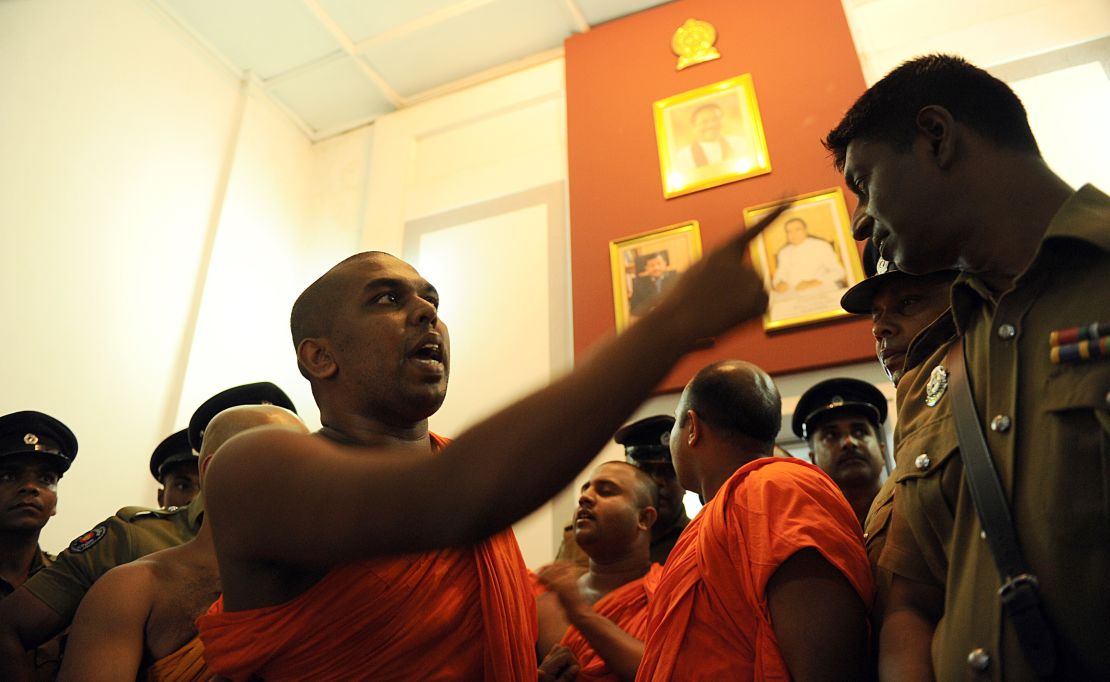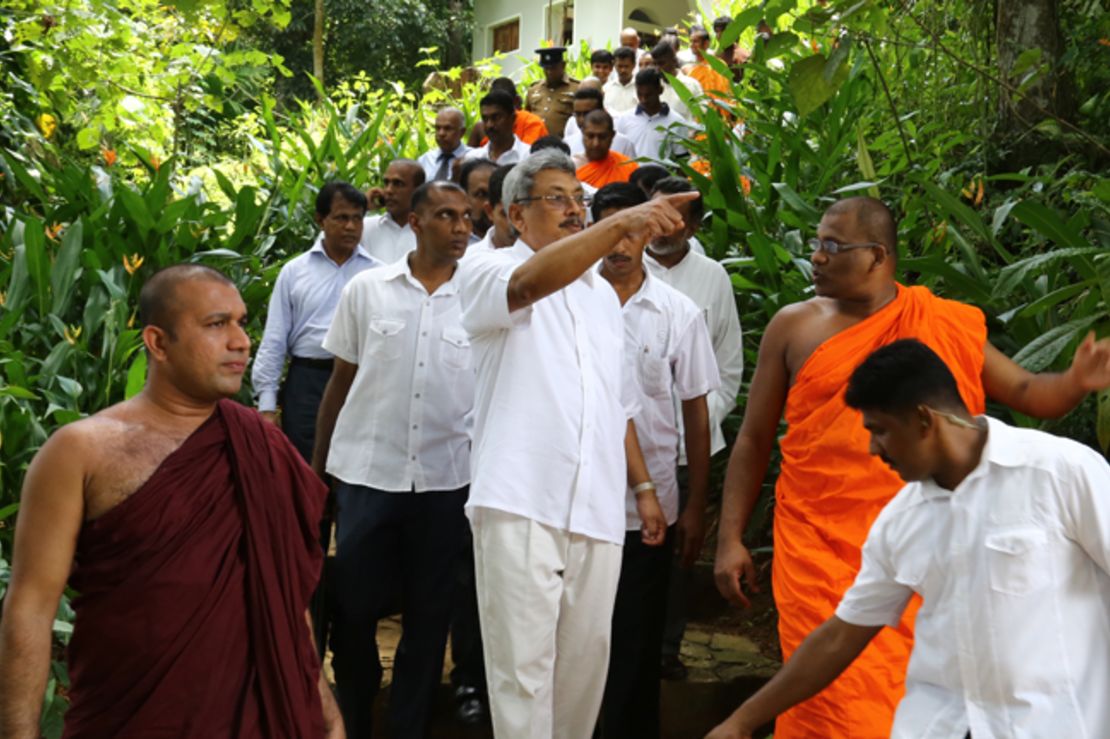Story highlights
An ultra-nationalist Buddhist group has been campaigning against Muslims in Sri Lanka
The Bodu Bala Sena is blamed by many for inciting religious riots that left 3 Muslims dead
A month on, a monk who gave an inflammatory speech before the riots has not been charged
Observers say it appears the group is operating with impunity, fueling the fears of minorities
Shortly before Buddhist mobs made a deadly rampage through Muslim neighborhoods near the town of Aluthgama, Sri Lanka last month, a man with cropped hair and glasses stood before expectant crowds to deliver an explosive speech.
Video footage of the rally, called following a traffic altercation between Muslim youths and a Buddhist monk in the coastal town, captures the speaker in full flight.
In a pointed reference to the security forces stationed nearby, he declares that the Sri Lankan police and army are Sinhalese, the mostly Buddhist ethnic majority that accounts for three-quarters of the island’s 20 million people.
Then, his arm raised and his voice rising to a shriek, he issues an explicit threat to Muslims, using a derogatory term for the minority.
To roars of approval, he vows that if any Muslim, were to lay a hand on a Sinhalese – let alone a monk – that would “be the end” of all of them.
What is striking about the clip, aside from the viciousness of the rhetoric, is that the firebrand behind the microphone is dressed in the saffron robes of a Buddhist monk.
He is Galagoda Aththe Gnanasara, the Buddhist holy man who is the general secretary and public face of the Bodu Bala Sena (BBS, also known as Buddhist Power Force).
The ultra-nationalist Sinhalese Buddhist organization has emerged as a troubling presence on the Sri Lankan political landscape in recent years, and is blamed by many for inciting the deadly violence in Aluthgama.
“It was already a tricky situation,” said Mohamed Hisham, a social media activist and businessman, who was raised in Dharga Town, a Muslim neighborhood near Aluthgama that bore the brunt of the violence.
“But I believe the presence (of the BBS) had a major impact. They are to be blamed for inciting what happened.”
Nights of terror
What happened, according to witnesses and officials, is that shortly after the speech, Buddhist mobs marched through Muslim neighborhoods, ransacking dozens of homes and shops. Three Muslim men were killed, and sixteen seriously injured in the two nights of violence that followed, police said.
One month on from the violence, described as the worst attacks on Muslims in the country in years, 135 people have been arrested, police say.
But while Gnanasara has given a statement to police about the events of the day, he has yet to face any charges. A national police spokesman said officers were still considering whether he had played a role in inciting the violence. “We need to check whether he has provoked the men by making this speech,” he said.
The facts that the BBS’s chief demagogue walks free, that authorities allowed the rally to proceed, and that they failed to prevent the violence have created an impression that the group operates with impunity, said Hisham, fueling the fears of Muslims.
“The community is feeling that if they can go scot-free after causing this kind of mayhem, what lies ahead?”
For his part, Gnanasara rejected the suggestion that the BBS was in any way culpable for the violence, telling CNN at the group’s Colombo headquarters that it had “no involvement” in the incidents at Aluthgama.
“On the contrary, our organization was trying to defuse the tension after a monk was assaulted by a group of Muslim youths,” he said. “We continue to be blamed for the incidents and portrayed as Sinhala extremists. This is unfair and incorrect.”
Gnanasara was among a group of monks that visited the Ministry of Mass Media and Information Wednesday to file a complaint about news coverage of the Aluthgama incident, alleging the reports had disrespected Buddhism, Sri Lankan media reported.
In an earlier statement on the BBS’s website – prompted by the cancellation of Gnanasara’s U.S. visa in the aftermath of Aluthgama – the group condemned the violence there, but acknowledged that BBS representatives had “delivered emotional speeches emphasizing the need to protect Sinhala Buddhists, who are actually a very small global minority.”
‘Saffron fascism’
Others believe concerns about the BBS are well founded.
Dayan Jayatilleke, a political scientist and former Sri Lankan diplomat, referred to the group’s politics as “saffron fascism” and described it as “a wholesaler of the ideology of hate, especially Islamophobia.”

While the BBS remained a fringe movement, he said, it appeared to be gaining influence among Buddhist clergy. “(The BBS) have to be taken very seriously indeed.”
Paikiasothy Saravanamuttu, executive director of Sri Lanka’s Centre for Policy Alternatives, believed the group, which he described as a purveyor of “classic hate speech,” had become emboldened by the lack of censure over the events at Aluthgama.
“Their more violent or aggressive demonstrations of power, involving even criminal acts, have gone unpunished,” he told CNN.
“They seem to have a lot of support, if not protection, from within the regime itself.”
He added that there had been insufficient denunciation of the group, both from Buddhist authorities and the state.
“Disciplinary action should be taken from within the priesthood against people who are, in the name of Buddhism, violating every single thing that Buddhism stands for.”
Militant Buddhism
Along with their co-religionists in Myanmar – where a monk-led anti-Muslim group, the 969 Movement, has been blamed for instigating deadly clashes – Sri Lanka’s Buddhists were the subject of a recent plea from the Dalai Lama during a speech on his birthday, calling on them to desist from violence against Muslims.
How is it that Buddhist monks – exponents of a religion associated with peace and non-violence – have come to be viewed as hate merchants?
Jayatilleke said that the rise of militant Buddhism should not be surprising. There had been a “fanatical strain running through Sinhala Buddhism for years,” he said. One prime minister, S. W. R. D. Bandaranaike, was assassinated by a monk in 1959.
“In the history of religions, you have long periods of perversion of the ideals of the original founder,” he said.
Formed in 2012, the Bodu Bala Sena was born as a vehicle to more stridently defend Sinhalese Buddhism, when Gnanasara and a fellow monk broke away from another monk-led Sinhalese nationalist party, the Jathika Hela Urumaya (JHU). Gnanasara had previously run as a political candidate for the JHU, a member of President Mahinda Rajapaksa’s ruling alliance.
Since its formation, the group has campaigned on issues including alleged poor treatment of Sri Lankan Buddhists working in the Middle East, Christian evangelization, anti-Buddhist riots in Bangladesh and hotels featuring “Buddha bars” popular with foreign tourists, often storming venues in organized “direct actions” to make its point.
Islam targeted
But overwhelmingly its target has been Sri Lanka’s Muslim community, which accounts for about 10% of the population.
Issues raising its ire have included halal certification, the burqa, mosque construction, Islamic conversion and alleged Islamic militancy – in a country with no history of domestic Islamic extremism. So why are Muslims suddenly in the cross-hairs?
Jayatilleke said that anti-Muslim sentiment within the Buddhist clergy had only arisen since 2009, when the 25-year civil war between the government and separatist Tamil rebels ended.
“When the war was over, the Sinhalese looked around and found that while the two major communities were bashing each other, the Muslims had been at peace and had prospered,” he said. “They found more mosques, stores, better educated young Muslims – a changed profile after years of war. And they lashed out.”
Saravanamuttu said the BBS’s anti-Muslim rhetoric tapped into concerns about global jihadism, an “atavistic fear” of high Muslim birth rates and resentment of the perceived success of the Muslim business community.
It fed into a dominant ideology of aggressive Sinhalese Buddhist nationalism that was also pushed by the government, as a way of making itself seem “eternally relevant and needed,” he said.
“It’s a range of arguments to make the Muslims into ‘the other’ and say that the Sinhala nation is under threat and requires protection,” he said.
Official protection?
The leeway the BBS has been given to carry out its activities has led many to speculate it must be operating with a degree of official sanction.

But the question of how closely the BBS is tied, if at all, to Sri Lanka’s government is murky.
The most powerful figure often associated with movement is Gotabaya Rajapaksa, the Secretary of Defense and the president’s brother, who officially opened an academy linked to the BBS in Galle last year where he was photographed with Gnanasara, said Jayatilleke.
He had also spoken in support of the JHU, the BBS’s allies, Jayatilleke said.
“Gotabaya Rajapaksa has been patronizing or been associated with the Sinhala religious right even before the BBS,” he said.
But Brig. Ruwan Wanigasooriya, spokesman for the Ministry of Defence and Urban Development, said Rajapaksa had no relationship whatsoever with the BBS. He had been “more or less” compelled to attend the Galle opening ceremony due an invitation from a respected monk, said Wanigasooriya, and Gnanasara had merely been one among many monks present.
Wanigasooriya said Sri Lanka was a pluralistic democratic country in which religious organizations enjoyed freedom to operate, but that Rajapaksa deplored any form of violence.
Mohan Samaranayake, spokesman for Sri Lankan President Mahinda Rajapaksa, said there was “no protection or special treatment” for the BBS from the government, including Gotabaya Rajapaksa. Anyone who broke the law would face the consequences, he said.
“Even the Bodu Bala Sena general secretary was questioned” over the events that took place in Aluthgama, said Samaranayake. “Investigations are still ongoing. I cannot predict the outcome.”
Gnanasara told CNN his organization had no backing from the government or Rajapaksa.
A political dilemma
Jayatilleke said that even if the BBS had once proven of some political benefit to the Rajapaksa regime, it now loomed as a problem.
The type of violence seen in Aluthgama was “completely unproductive as far as the government is concerned,” he said.
Indeed, Gnanasara had criticized the president in his Aluthgama speech, claiming that the Sinhalese lacked a leader, in what Jayatilleke said seemed to be a direct appeal “to the Sinhala Buddhist sentiments of the armed forces and police.”
The comments, he said, appeared to represent a bid by the Buddhist clergy to position itself “for the leading role in society and the state.”
Despite the challenge to his authority, Jayatilleke said President Rajapaksa appeared to have made a calculation not to crack down on the BBS, as to do so ran the risk of triggering rioting, or making martyrs of them to their support base in the security forces.
“He doesn’t want to make a hero of this guy. They’ll probably box him in rather than lock him up.”
Onlookers believe that calculation will carry its own consequences.
Hisham fears the unwarranted accusations of extremism could eventually become a self-fulfilling prophecy, pushing some members of his community in that direction as long as the BBS and its supporters were free to target them with impunity.
And Saravanamuttu predicted that in the absence of any censure, an emboldened BBS would only escalate its activities.
“Impunity breeds further violation,” he said. “If this is a country of law, it needs to be brought to bear on whoever breaks it – irrespective of whether they’re in robes or not.”
Journalist Iqbal Athas in Sri Lanka contributed to this report.

